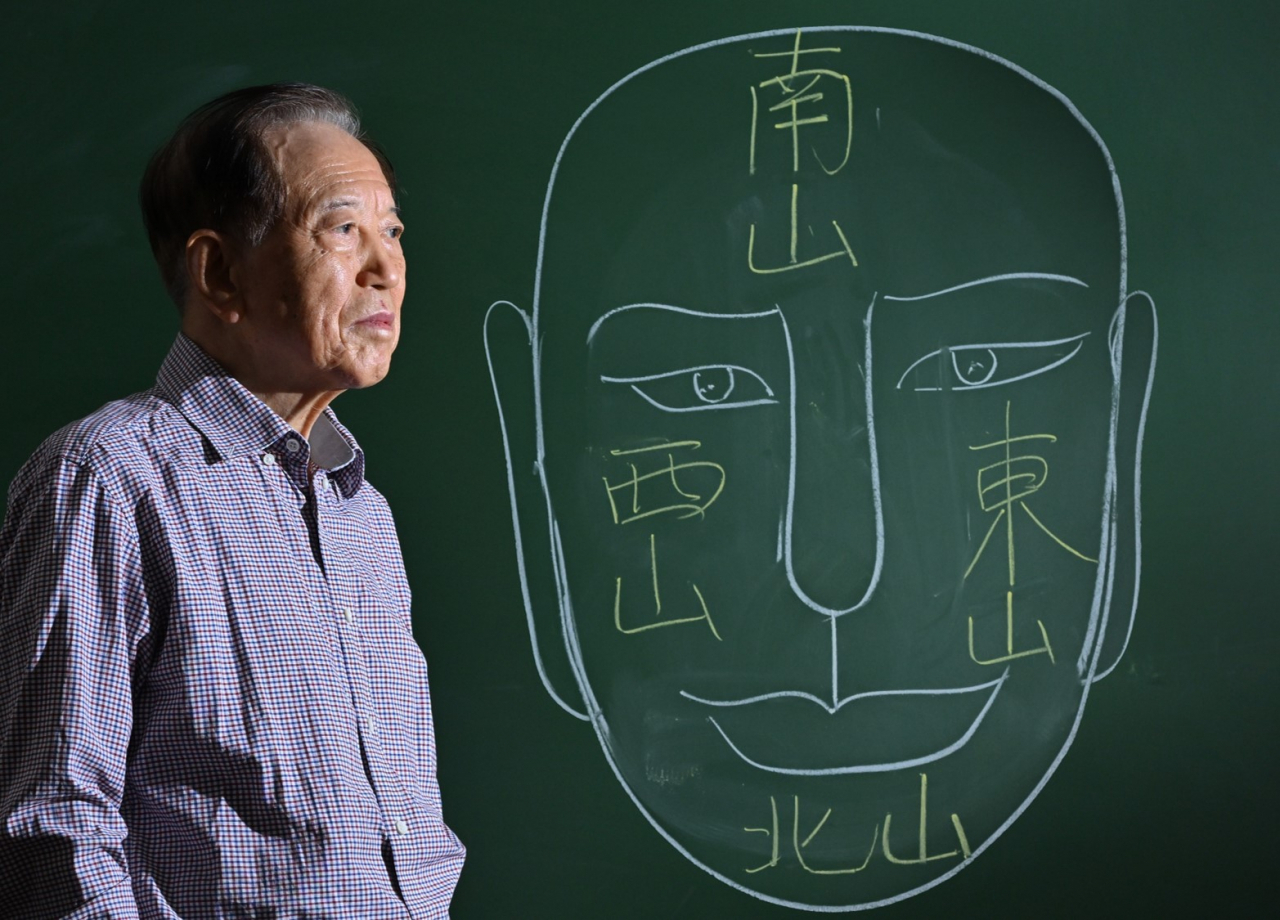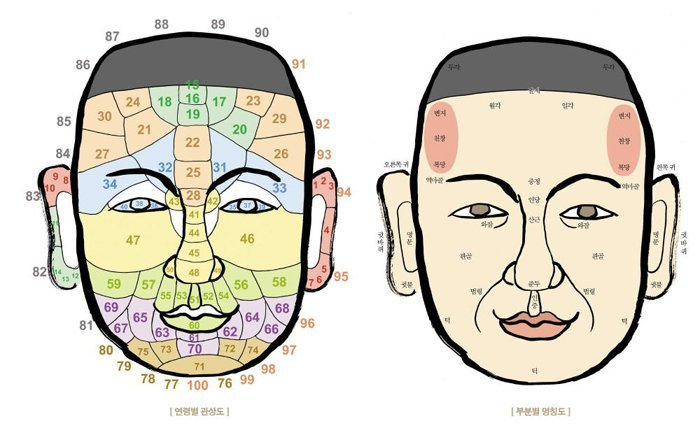 |
Physiognomist Shin Ki-won (Lim Se-jun/The Korea Herald) |
"Who has the face of a king?”
In the 2013 hit film "The Face Reader," set in the 15th century during the Joseon era, Grand Prince Suyang sought the advice of the most renowned face reader of the day about his potential to become king. The physiognomist thought Suyang had the face of a cruel and ruthless traitor but refrained from voicing this belief out of fear.
Some years later, Suyang ascended to the throne as the 7th king of Joseon, known as King Sejo, by dethroning Danjong, his 15-year-old nephew, and ultimately forcing him to ingest poison to end his own life, completing one of Joseon’s most tragic royal tales.
Face reading is more than just movie material, as it continues to be practiced even in Korea today. Every election season, politicians and political aspirants visit the offices of renowned physiognomists seeking predictions on future national leaders based on interpretations of their facial features.
Ordinary Koreans, too, visit these experts to seek fortune-telling guidance, similar to getting a "saju" (four pillars of destiny) reading or palmistry.
Shin Ki-won, 85, has been in the industry for nearly six decades and has read the faces of numerous politicians and business moguls. In a recent interview with The Korea Herald, he stressed that no one can live contrary to one's physiognomic traits, which determine their destiny.
What constitutes a ‘good’ face?
A good face is, he said, one that resembles the fundamental physical characteristics of nature.
"Face reading is about seeing the harmony of the face by comparing it to nature," he said, in his office in Seoul.
According to the veteran physiognomist, one's forehead and chin are likened to the sky and the Earth, respectively; the eyes are like rivers; the nose is like a mountain; the mouth is like the sea; and the eyebrows are like plants.
He explained that a "wide and high" forehead and chin are considered favorable. The nose, representing a mountain, should have a "majestic" appearance. However, an overly high nose may signify loneliness. The mouth, symbolizing the sea, ought to be "broad," as a small mouth is thought to hinder significant achievements. Eyebrows, likened to foliage, should be "continuous" and "well-groomed." Overall, a harmonious face should not be overly narrow, with a moderate width being deemed ideal.
Moles can influence one’s destiny, Shin continued. A mole located on one's left ear is often associated with "intelligence," while a mole on the right ear is interpreted as a sign of "filial piety." The presence of a mole near the corner of one's eye may indicate the possibility of that person becoming a widow or widower. A mole located on one's temple is regarded as an indicator of "good fortune."
Regarding one's height, “A shorter stature is preferable,” he said. Referencing former Presidents Park Chung-hee and Kim Dae-jung and French emperor Napoleon Bonaparte, he said, “There are more great and talented individuals among those who are shorter.”
Born in 1939, Shin is the son of a Korean traditional medicine practitioner. Influenced by his father, he developed a deep interest in Chinese classics and philosophy from a young age. He began studying physiognomy in earnest in 1965. His expertise led him to become both a character in and consultant for “Kkol” (Look), a comic by renowned cartoonist Hur Young-man.
Shin rose to fame after predicting that candidate Lee Myung-bak would become president. He observed that Lee’s facial features, particularly his “cold eyes,” were not favorable physiognomically. But the face of his wife, Kim Yoon-ok, influenced his prediction of Lee’s political fortune in the presidential election. "She had a perfect face according to physiognomy -- the face of a queen.” Lee served as president from 2007 to 2013.
As for current President Yoon Suk Yeol, Shin noted his wide and high forehead as a positive trait, though his prominent brow bones indicate a propensity for stubbornness.
 |
Physiognomic diagrams (Physiognomist Shin Ki-won's office) |
Faces of wealth, intellect and longevity
What features characterize the face of a wealthy person?
“Having eyebrows that sit higher on the forehead is seen as an indicator of potential wealth," Shin said.
He further noted, "The nose of a wealthy individual tends to be wide, low, full and fleshy, rather than high," referencing the noses of Hyundai Group founder Chung Ju-yung and American billionaire Warren Buffett.
Although former Samsung Chair Lee Kun-hee lacked what is typically considered the nose of a wealthy person, he was endowed with "cows' eyes." Eyes that are large and round like a cow's signify the potential to amass a significant fortune.
As for intelligence, there is also a specific facial feature. Exceptionally smart people have narrow and long eyes. Their eyes are gleaming and slightly droopy.
“Apple founder Steve Jobs had smart eyes that shined brightly,” he said. “But his nose was lean and pointed without being full and fleshy, which signals loneliness.”
The facial features associated with living a long life include having long ears.
“They should be long and large. Merely being short and large is not sufficient. The earlobes must be long,” he said, adding well-known philosopher Kim Hyung-sik, 104, has long earlobes.
Upon evaluating this journalist’s facial features, he remarked on the absence of features indicating luck in wealth. He recommended that individuals lacking luck in wealth are better suited to salaried employment.
Shin is a fatalist. He believes that physiognomy is innate and that people live according to their appearance. He has never encountered someone who has lived contrary to their physiognomic traits, he claimed.
What about plastic surgery? Can one alter their destiny with nips and tucks?
Shin answered with a firm, "No."
“A person’s external appearance is shaped by the energy emanating from their internal organs,” he said. “Since the face is a reflection of the internal state, merely changing one's external features is ineffective in altering one’s destiny.”
He cautioned that artificially modifying facial features could result in a less favorable physiognomy, as it hurts one's natural balance.
For instance, making one's jawline slimmer to obtain a V-shaped face is a bad idea that could threaten one’s financial stability in later years. Similarly, a nose job could influence the likelihood of a person leading a lonelier life, he explained.




![[Herald Interview] How Gopizza got big in India](http://res.heraldm.com/phpwas/restmb_idxmake.php?idx=644&simg=/content/image/2024/11/20/20241120050057_0.jpg)


![[KH Explains] Dissecting Hyundai Motor's lobbying in US](http://res.heraldm.com/phpwas/restmb_idxmake.php?idx=644&simg=/content/image/2024/11/20/20241120050034_0.jpg)